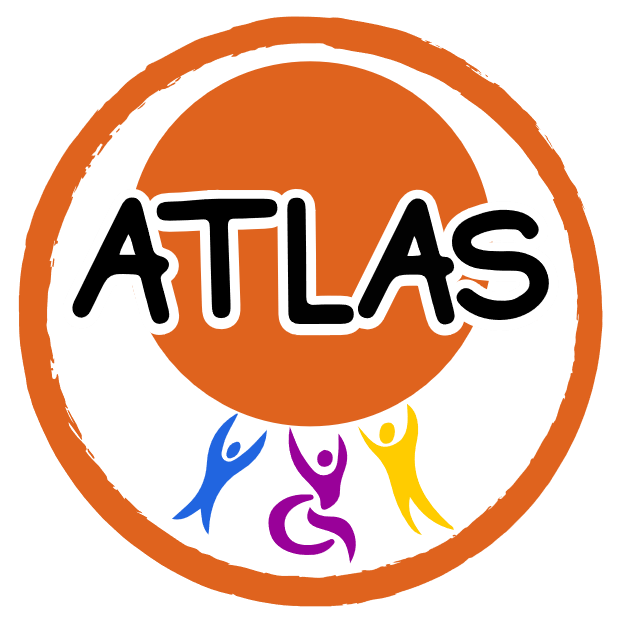Contents
Please note that this post has since been edited to update the blog the group’s new name: ATLAS (previously SYAS).
Introduction
Recently I have been facilitating some of the virtual group meetings with the ATLAS members. As this week is anti-bullying week, the young people have been sharing their experiences with stigma and bullying as well as discussing ableist language and how they self-describe.
Overall, it is felt and experienced that stigma and bullying are still prevalent. ATLAS are telling us that we all need to be doing more to increase the visibility of additional needs and disabilities, as well as mental health (find out more on comorbid mental health with additional needs and disabilities), throughout society.
One of the repeating themes of discussion has been the importance of language in their experience as young people with additional needs and disabilities; how the language used to define and describe them has a direct impact on their lives.
What is stigma?
In this context, stigma is used to refer to the negative stereotypes and associations that society or individuals hold against a group of people. This results in prejudice and discrimination against the stigmatised group at social and/or structural levels.
In some cases, individuals from the stigmatised group can internalise this stigma, which affects how they view themselves and the expectations they have of themselves. This is known as self-stigma. An example of this which I have heard frequently and struggled with myself can be seen with dyslexia.
Due to the stigma around dyslexia, unfortunately you often hear people with dyslexia calling themselves words like stupid, or setting low expectations for themselves. They may be used to similar treatment from the people around them since diagnosis or had heard of the stigma before realising they were dyslexic themselves. Our member Ryan touches on this in his blog on dyslexia.
Stigma can lead to people being stereotyped, isolated and discriminated against. Ultimately this can have a variety of impacts on the targeted individuals, including avoiding diagnosis or treatment, and becoming the target of bullying.
Bullying
People “make fun of disability in my school.”
There are many different types of bullying and many reasons why someone may be bullied. When it comes to young people being bullied for their additional needs and disabilities, ATLAS felt like this was predominantly because of two factors: being different and the stigma surrounding their additional needs and disabilities.
“If you are different you are going to get bullied”
There is “not much understanding about how to stop [bullying and stigma]… people are still ignorant”
Stigma-based bullying is especially complex because it not only requires localised anti-bullying action but also a society-level approach to reduce stereotypes and prejudice on a larger scale.
An important part of tackling bullying aimed at people with additional needs and disabilities will be to address the widespread ableism and lack of disability awareness in our society.
“I don’t want to be made out to be ‘special’ because I have needs.”
Our role in ableism
What I can do and achieve is “underestimated by the college and my peers” because of my diagnosis
An ableist society is defined by its assumption that people without additional needs or disabilities are the norm. The way that society, physical structures and policies are designed is inherently exclusionary and inaccessible. This results in the limitation and undervaluing of people with additional needs and/or disabilities.
The way ableism presents is complex and can impact people on a variety of fronts. This ranges from the texture of a pavement surface or the lack of braille on building signs, all the way up to public attitudes and the very language used to define us.
“[Ableist] language is used on all official forms from the government. Ableist language is used as the basis of everything.”
People who do not experience and/or are not knowledgeable about additional needs and disabilities may find it hard to see how others can be disadvantaged by design or realise the existence or extent of stigma.
“Sometimes it’s not the words themselves, but the attitudes … You can use the word disabled in a derogatory fashion.”
I would like to recommend that if you are ever in doubt about the language you are or will be using, please ask the people described or impacted by that language.
Self-description
The way in which words are used to describe people shows how society sees them and acts as a perceived measure of both their worth and overall contribution to that society. How we define ourselves reveals our internal existence and true lived experience.
“Everyone around me assumes that I am not able to do things. Whereas I can’t do some things some days, but I can other days … They had only read the language on my report and not met me. Then I spoke to them on the phone and they realised their mistake, encouraged me to go to university.”
When public speaker and anti-bullying activist Lizzie Velasquez was 17 years old, she discovered that she had been titled “The World’s Ugliest Women” due to her disability: a rare congenital disease called Marfanoid–progeroid–lipodystrophy syndrome that prevents her from developing body fat.
In this powerful TED Talk she talks about the importance of self-description for everyone and asks: “what defines you?” (closed captions are available for this video).
You can find out more about Lizzie on her Youtube channel.
The power of participation
The User Voice and Participation (UVP) Team believe that the voice of the service user should inform our practice. Our aim is not only to make sure that the voices of young people are heard but also to facilitate participation groups that embody the meaning of participation, as defined by the young people that we work alongside.
This process is ongoing and always will be. Through this process we hope to help young people grow as individuals. We should not just take feedback from young people, but also give back in ways defined by the young people themselves. Examples of this include helping them develop confidence, providing Makaton training or interview skills advice.
“ATLAS has helped me build friends but not just in ATLAS, outside too, as it has given me confidence.”
Previously, ATLAS was called SYAS (SEND Youth Advisors Surrey). Members worked to rename and rebrand the participation group so that it aligns more closely with how they self-describe.
As a group, not only will ATLAS be redefining itself, but the young people will also be creating a report of preferred terminology, due in the summer.
“My disability is fluid.”
Due to recognition of the fact that people identify with different words in different ways, ATLAS have decided to use a traffic light system to indicate whether words should never be used (red), that some people may be okay with some words (amber) and words that are more widely accepted (green).
“I would rather say I have additional needs than say that I’m disabled.”
“Everyone identifies with the word ‘disability’ differently. Some Deaf and Blind people don’t consider being deaf and blind a disability. But for me I am chronically ill so it doesn’t matter where you put me, I’m still in pain all the time. Some disability you might have a better experience, but with my chronic illness I am not gaining, I am only losing.”
Watch this space for more news about ATLAS and how their participation will be changing to be more accessible! In the meantime I will leave you with one last thought from our young people about the language around additional needs and disabilities:
“Honestly a lot of time it’s about asking. It is about how someone self-describes.”

